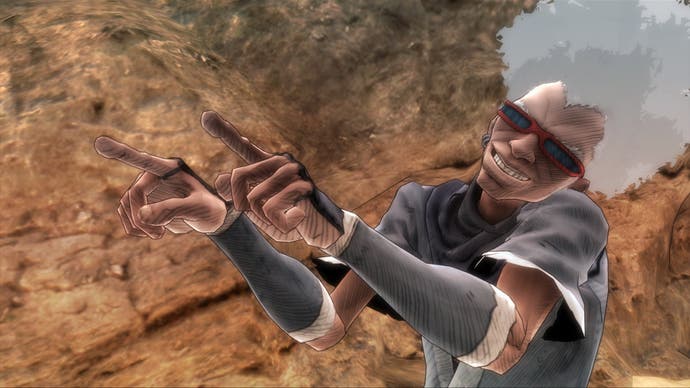Afro Samurai
Bubble-headed.
As fun as the combos are, as perversely gratifying the whispery arterial gush that accompanies every death, there are issues with Afro Samurai's fight system, too. In an effort to reduce challenge without turning the game into a pushover, the designers have made it fairly easy to land hits but given enemies copious amounts of health, so most take just that little bit too long to wear down. Indulgent use of Focus helps relieve ennui, it's true, but later on you'll be wanting to save it for when you actually need it.
There's also precious little sense of progression to the combat. You start out as a badass, and maintain the same level of badassness against incrementally tougher enemies as the game progresses. Every once in a while you'll level up, unlocking a new combo, but it seems to make no difference to your effectiveness or tactics. You keep on chopping, they keep on coming, and while you might fall in love with some new combo or other now and then, it won't change the game in the slightest. The few enemies who do break up the flow - snipers, or the spindly, creepy, Jack O'Lantern androids - are mostly basic, low-level irritations.
There's a far bigger problem than the sameness, however. It's the boss fights, of which there are plenty, thanks to the structure of the Afro Samurai fiction - Afro and other eccentric warriors all competing for the Number Two head-band and the right to take on the Number One, who killed Afro's father. As you move through the game, you'll take on a Number Two and then be continuously jumped by others after your bandana.
The boss fights aren't too hard, but for the most part they make the game's best feature - Focus - an irrelevance, depending instead on extreme over-use of the weak, poorly-timed and simply not enjoyable parry mechanic (a block at just the right moment will open up these and other enemies to counter-attack). The fights therefore put you in a near-permanent defensive stance, wearing down bosses with a quick combo where you can, rather than encouraging you to use the longer, flowing combos and showy finishing moves that Afro Samurai actually does rather well. "Body-part poker" is better, a mini-game within the game that rewards you for completing "hands" of enemy limbs and heads using Focus.

Contrary to our expectations, then, Afro Samurai is a game that doesn't make the best of what it has. And, sadly, that does include its licence, despite the initially favourable impressions. The look's there, absolutely, as are the sounds and the counter-culture cachet. But the narrative is meaningless, disjointed, poorly told and barely related to the action; the characters don't have anything like the resonance they should. Cut-scenes and snatches of dialogue jump in and out at random, sometimes terminated by loading screens halfway through. Even star attraction Samuel Jackson - filling the role of jester/sidekick Ninja Ninja - ultimately comes across as tiresome and crass, although you can't say he doesn't put any effort into his lines.
By no means is Afro Samurai a terrible game - it's beautiful, bloody and undemanding, a vacant button-masher with just enough attitude twinkling out from under its heavy stoner's eyelids to get by. But like most heavy stoners it's also frustrating, unrewarding and a bit dull to spend time with, and rather lazy. Afro Samurai is slightly less than the sum of its parts, where its contemporaries - other traders in mindless violence and low-rent pop-culture exploitation like The House of the Dead: Overkill, say, or 50 Cent: Blood on the Sand - add up to a fair bit more. We thought it would lift itself above the average. We were wrong.








